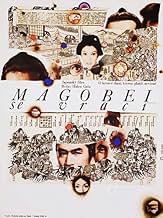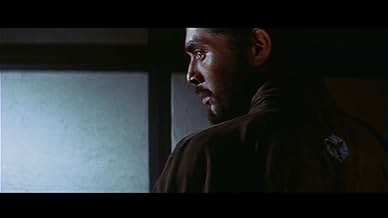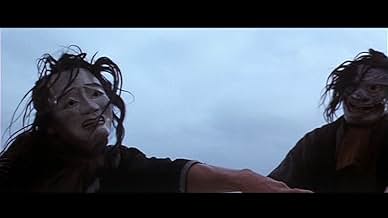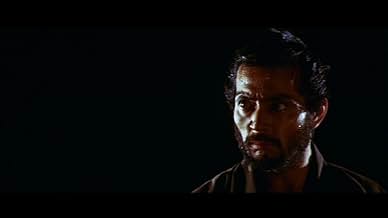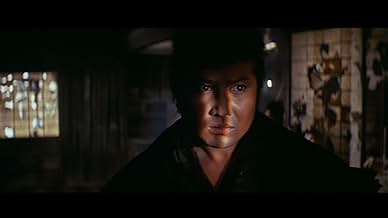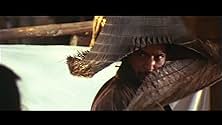IMDb-BEWERTUNG
7,6/10
2769
IHRE BEWERTUNG
Ein von Schuldgefühlen geplagter Samurai-Krieger versucht, ein stattfindendes Massaker zu verhindern.Ein von Schuldgefühlen geplagter Samurai-Krieger versucht, ein stattfindendes Massaker zu verhindern.Ein von Schuldgefühlen geplagter Samurai-Krieger versucht, ein stattfindendes Massaker zu verhindern.
- Auszeichnungen
- 2 Gewinne & 1 Nominierung insgesamt
Empfohlene Bewertungen
"Goyokin" is passionate, poetic, beautiful, colorful, thrilling, and brilliantly-filmed. It would be an understatement to say that "Goyokin" is one of the best-looking films I've seen in a long time. Hideo Gosha is one of the most under-appreciated Japanese directors and I say this purely on the strength of this one film because it is a true masterpiece.
"Goyokin" has a sense of theatricality about it that fits better than even many of Kurosawa's films. "Rashomon" for instance features performances completely unsuitable for the film's general mood (in my opinion), but in "Goyokin" the nature of the film fits perfectly with the mood and atmosphere Gosha creates. It's almost operatic in many ways, most noticeably so in the exquisitely-filmed sword fighting scenes. The story itself is also fitting of an Opera or an ancient Greek or Roman tragedy. In the tradition of many chambara films the film is reminiscent in sensibility to a revisionist Western, which can either come off as interesting or forced and in this case reminded me of some of the great American and Italian Westerns that came after the genre's popularity started dying.
Gosha's work here is spectacular. The selection of shots and his coordination with the camera operator are brilliant. The cinematography by Kozo Okazaki displays a fine and mature understanding of the mechanics of photography for film and captures the landscape of the film brilliantly. All the acting is good but Tatsuya Nakadai is truly memorable in the lead role.
I find it exceptionally hard to write extensively about movies I truly love because I find it hard to articulate my thoughts. I'm not sure I have much to say about this film since it struck me on such an emotional level and because it only matters that it is a passionate, poetic, and stunningly well-filmed movie that stands as my favorite movie in the genre quite easily and has immediately become one of my all-time favorites.
10/10
"Goyokin" has a sense of theatricality about it that fits better than even many of Kurosawa's films. "Rashomon" for instance features performances completely unsuitable for the film's general mood (in my opinion), but in "Goyokin" the nature of the film fits perfectly with the mood and atmosphere Gosha creates. It's almost operatic in many ways, most noticeably so in the exquisitely-filmed sword fighting scenes. The story itself is also fitting of an Opera or an ancient Greek or Roman tragedy. In the tradition of many chambara films the film is reminiscent in sensibility to a revisionist Western, which can either come off as interesting or forced and in this case reminded me of some of the great American and Italian Westerns that came after the genre's popularity started dying.
Gosha's work here is spectacular. The selection of shots and his coordination with the camera operator are brilliant. The cinematography by Kozo Okazaki displays a fine and mature understanding of the mechanics of photography for film and captures the landscape of the film brilliantly. All the acting is good but Tatsuya Nakadai is truly memorable in the lead role.
I find it exceptionally hard to write extensively about movies I truly love because I find it hard to articulate my thoughts. I'm not sure I have much to say about this film since it struck me on such an emotional level and because it only matters that it is a passionate, poetic, and stunningly well-filmed movie that stands as my favorite movie in the genre quite easily and has immediately become one of my all-time favorites.
10/10
I just had to write something when I saw that the current spotlighted user's comment calls this movie merely "decent." I just got back from seeing it on the big screen, and believe me, it's WAY more than "decent." More like amazing. I am truly grateful to have had the opportunity to see it. I'll be the first to admit that it's at times narratively challenging, and that the main character is fairly one-note. But it really compares in many respects with classic westerns like The Searchers. Plus a truly inventive, exciting, and striking climax. Full of visual poetry. Ten lines really does seem like a bit much to require people to write. Would six be so awful? All I really wanted to do was provide some balance to the "decent" comment. Wow. I'm still just at nine lines. Okay. See this on the big screen if you have a chance. It's truly a widescreen picture that uses the frame quite inventively at times. And that's eleven lines, so I'm done.
I saw this film in the late 1970s. It was called "Goyekin - The Emperor's Gold". As I watched our guilt-ridden hero return to fulfill his promise, really a threat, to punish his family if they repeated their crime. I still see the image of him striding along the beach with a conical hat pulled low. The shadow on his face made his eyes glow under the hat and the shot was taken with a telephoto through wispy beach grass. Completely memorable. Then the scene in the forest with the horsemen riding through. It looked like an ancient Japanese painting with hazy colors and an other-worldliness that was amazing. Then the concluding duel in the snow. Two brilliantly attired samurai dueling in a pure white, glistening environment. So many great images from one film!
The film itself is a pretty typical revenge film with some twists. When Tom Laughlin tried to redo it as a Mexican western,"The Master Gunfighter", it just fell flat. But the samurai movie has an entertaining plot and good action characters with beautiful settings. I think this film is a special case of cinematographic excellence. See it and enjoy the beauty.
The film itself is a pretty typical revenge film with some twists. When Tom Laughlin tried to redo it as a Mexican western,"The Master Gunfighter", it just fell flat. But the samurai movie has an entertaining plot and good action characters with beautiful settings. I think this film is a special case of cinematographic excellence. See it and enjoy the beauty.
A remorseful samurai struggles to reconcile clan loyalty with honourable behaviour after turning a blind eye to the massacre of innocent villagers to cover up the theft of gold intended for the Tokugawa shogunate. Thematically similar to director Hideo Gosha's other chanbara, this film takes a hard look at the unquestioning obedience demanded of underlings in feudal societies and how the honour and fidelity can be manipulated to dishonorable and wicked ends. The three leads, Tatsuya Nakadai, Kinnosuke Nakamura, and Tetsuro Tamba, all well-established actors in Japanese cinema (both in jidaigeki and other genres), are excellent. The cinematography, which includes some fanciful imagery is great, the story interesting, and the 'action sequences' well-done and entertaining. All in all, a great entry in the popular genre from a top Japanese director.
I saw "Goyokin" in 1969 at a small theater in Yokohama, Japan. It was in Japanese, of course, but the evolution of the story was understood. The film was so well done, and beyond what I was used to as an American watching Japanese movies in Japan. The acting was superb and the tension was palpable. The story was unique and its presentation was gorgeous. It's not hyperbole to say I was awestruck. With the advent of VHS I began searching for this movie as a video. After years of searching, I bought a barely watchable re-re-re-reprint with multiple subtitles. I was happy to HEAR the movie again! Tom ("Billy Jack") Loughlin made the putrid, displaced "The Master Gunfighter" but it was ludicrous as a Western. I will never understand why this classic has not been produced as a Video! Obviously, many people know about it, and it appears on wish lists throughout the world. It deserves the full DVD treatment and, PLEASE, while the great Tatsuya Nakadai is still alive to provide commentary on it.
Wusstest du schon
- WissenswertesThis is the first Japanese feature film in Panavision.
- VerbindungenFeatured in Trailer Trauma V: 70s Action Attack! (2020)
Top-Auswahl
Melde dich zum Bewerten an und greife auf die Watchlist für personalisierte Empfehlungen zu.
- How long is The Steel Edge of Revenge?Powered by Alexa
Details
- Laufzeit2 Stunden 4 Minuten
- Sound-Mix
- Seitenverhältnis
- 2.35 : 1
Zu dieser Seite beitragen
Bearbeitung vorschlagen oder fehlenden Inhalt hinzufügen

